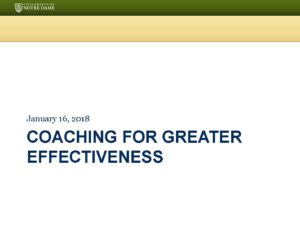
On January 16, 2018 we held a mini session where we covered:
- Coaching Blocks
- Best Practices for Sustaining a Coaching Culture
Click here here to see the content we covered!

On January 16, 2018 we held a mini session where we covered:
Click here here to see the content we covered!
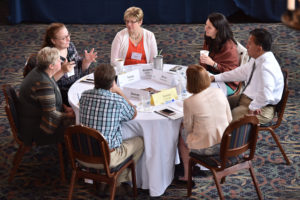
During Fall Break, I was really excited about going to the LaFortune Starbucks. For the first time in a while, there wasn’t going to be long line to get a latte. I wasn’t the only one with this idea – I ran into Monica Crabtree, one of my coaching table colleagues while there!
We caught up as we were waiting for our drinks to be ready, and she asked:
“Have you used what we learned in Coaching for Greater Effectiveness yet?”
I paused. I had recently asked a good friend of mine a powerful question, but I hadn’t used SBII yet. I asked her:
“Have you?”
She said yes!
A couple of weeks passed, and I had an opportunity to use SBII. In the moment, I was nervous, but I thought of courage and the SBII script, and went for it. I described the Situation, the Behavior, the Impact, and asked about the Intent. I ended up having a really good conversation with the person I was coaching, and was so happy to have done it that I emailed my table coach to celebrate!
I really appreciated Monica asking whether I had used what we had learned yet – it was a great way to keep me accountable.
So let me ask you this – have you used what we learned in Coaching for Greater Effectiveness yet? How did you celebrate after you did?
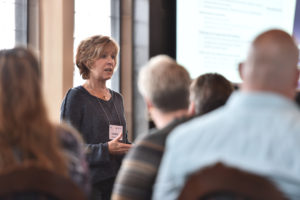
Do you ever feel judged by your peers because your work/life balancing scale seems completely lopsided compared to theirs? For me, work is my life. I know, now you’re thinking of the movie The Shining and the words that were typed over and over again: “All work and no play makes Jack a dull boy.” Don’t get me wrong; I love being around my family and friends, who fill up my tank of joy, but my career encompasses much of my time and I am okay with that.
I must admit though that this is an area I’ve struggled with when interacting with others at work. The thought of tipping someone else’s work-life balance scale or even the appearance of that expectation tends to be the stress that gets to me most. Although I enjoy working at night in front of the television and sending off emails in rapid fire, I know for others this can be seen as an unwelcome intrusion into their personal time and can even lead to a feeling of inadequacy if they don’t respond promptly.
Going through Coaching for Greater Effectiveness, students learn that if you want a high performing team with meaningful relationships, you need to have both trust and candor. If someone on my team feels inadequate for not responding to my email at 10:00 at night, I haven’t been an effective coach. I need to be sensitive to my team members by letting them know I do not expect responses outside of normal business days/hours and then prove they can trust that statement by my subsequent actions.
The weights we put on our work-life scale are different for each of us and we must listen to our co-workers’ voices on what works best for them and the people depending on them. Building a foundation of trust begins by respecting your teammates’ decisions when it comes to their well-being.
How often do we talk with our colleagues, listening to their stress and worries, and then tell them what to do or try to fix it? Those responses come from a caring place, but do we really know what will bring them back to a state of calm that helps them be productive or take that next courageous step?
I was panicking in a recent leadership training exercise that put me very far outside my comfort zone. My heart raced; I was hyper-alert; my breathing was shallow and quick. I was quite literally afraid for my own safety, and because I was so anxious, I worried that my panic could put others in harm’s way. I wanted to be there; I wanted to participate and be part of our group, everyone else seemed to be okay, but all the warning bells were ringing in my head.
And then someone asked me, “What do you need to feel safe?”
That one question made me pause, putting aside my fear for a moment, and it was something only I could answer. It gave me control, reframing the situation in a way that let me decide what would help the most. It also gave me the opportunity to clearly share my boundaries and what I needed from others so that they could support me while we worked together. That question allowed me to find the courage to do something I wasn’t sure I could do, and ultimately, it led to our group completing our activity more smoothly and with more success.
Just think of the courageous next steps our colleagues might decide to take when given the opportunity to set their own course.
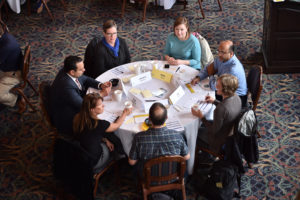
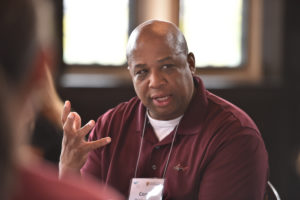
In the years I’ve been a leader, I can honestly say the best conversations I’ve had were those in which I used a coaching approach. Instead of telling someone what to do, I asked for their thoughts and they ended up discovering the answer.
Recently I had an individual who was having an issue with a co-worker. After asking about the situation I asked a powerful question – “what would it take to make it better”. The reply led the person to realize a conversation between them was needed and went on to have that conversation. I later heard that the interaction went really well and the situation had improved.